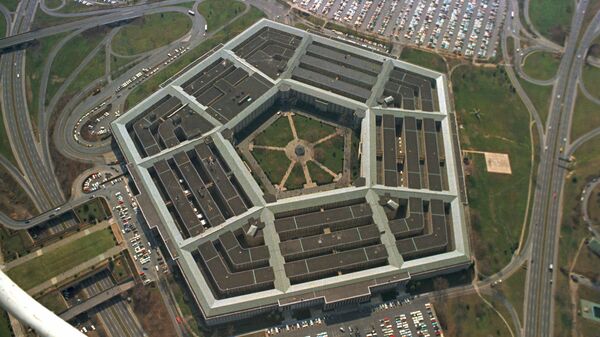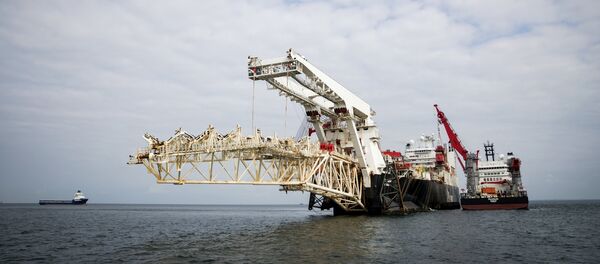The 2020 National Defence Authorization Act (NDAA) puts Russia on a watch list for its increased presence in Africa, requiring the US administration to devise a plan to counteract it. Ukraine is awarded a renewed $300 million security assistance, which includes $100 million for lethal defensive weapons.
Syria is punished with sanctions for alleged human rights abuses, while Israel, America’s key ally in the Middle East, gets full funding for the development of the anti-missile defence systems to the tune of $500 million.
In the NDAA the US Congress calls on Trump to pursue extension of the New START Treaty, the only remaining nuclear arms agreement with Russia, from its initial termination date in February 2021 to February 2026, unless the president determines that Moscow violates it or it is superseded by a new, more effective, control regime.
'Scalpel' Against Nord Stream 2
The NDAA provides for mandatory sanctions on Nord Stream 2 and TurkStream - two major pipelines under construction to export Russian gas to Europe bypassing Ukraine. The US lambasted them as a geopolitical rather than economic tool that would increase the continent’s dependence on Russia and add billions of dollars to Kremlin coffers bolstering it in a renewed "great powers" competition.
Moscow and its partners argue that both routes are commercially feasible and needed for enhanced stability of energy supplies.
"Narrow" and "scalpel-like" sanctions, introduced to the NDAA by a group of senators, seek to halt construction by targeting specialist companies that install deep-sea pipes for Russian-sponsored projects.
The legislation mandates the US administration to identify them in a report that is to be submitted to congressional committees no later than 60 days after the enactment. Senators Ted Cruz and Ron Johnson have, however, already sent a letter to Allseas Group S.A., a Swiss-based contractor for Nord Stream 2, urging it to stop activities on the project immediately and warning of "crippling sanctions" should it fail to comply.
Russia promises to complete the project despite the restrictions, and Germany, the main beneficiary of the project, has swiftly condemned the sanctions as "unacceptable".
"European energy policy is decided in Europe, not the US. The American sanctions on companies building the Nord Stream 2 gas pipeline are unacceptable because in the end they amount to interference in autonomous decisions made in Europe", German Foreign Minister Heiko Maas said, cited by the ZDF broadcaster.
Speaking at the Bundestag a day after the NDAA vote, Chancellor Angela Merkel confirmed that Berlin strongly opposed US extraterritorial sanctions in principle and intended to "decisively" discuss the matter with her US counterparts.
Daniel Fried, National Security Council senior director for Presidents Bill Clinton and George Bush as well as former assistant Secretary of State for Europe, hails the US approach as a manifestation of transatlantic solidarity.
"It’s not interference at all. The transatlantic community has common concerns about Russian aggression. We have for many decades developed a Russia policy in common. When we are together, it works. When we diverge, it works less well [...] But this is not an issue of US interfering in Europe", Fried said.
Experts diverge on the effectiveness of sanctions, admitting the lack of information to ascertain the time needed to complete the project and its technological limitations.
The Nord Stream 2 is a joint venture of Gazprom and five European companies. In total, some 627 firms are involved in building the route, including two pipe-layers - Allseas and Italy's Saipem. The tube's final offshore stretch is believed to be nearly completed at the bottom of the Baltic Sea. The pipeline is set to become operational in early 2020.
F-35 For S-400
Turkey came as another major target of NDAA restrictions. In a reprisal for purchasing Russian-made S-400 air defence systems, Ankara is barred from an option to buy and participate in manufacturing of the F-35 fifth-generation stealth fighters. To rejoin the program, Turkey needs to relinquish S-400s and pledge not to accept them in the future. The bill leaves the door open for supplying US Patriot anti-aircraft missiles to meet Turkish defence needs.
Turkey’s President Recep Tayyip Erdogan said that his country would retaliate with unspecified counter-sanctions and the Turkish Foreign Ministry blasted the NDAA for "negative language" and "unfair treatment".
The NDAA lifts a longtime ban to sell or transfer weapons to Cyprus despite its unresolved conflict with Turkey and throws support to energy partnership of Cyprus, Greece and Israel, which are planning the world’s largest undersea pipeline to export natural gas from the East Mediterranean to Europe.
While the purchase of S-400s is the main point of contention for the US, Turkey’s operation in northern Syria and its willingness to veto a NATO Baltic defence plan in order to force the alliance to recognize the Kurdistan Workers’ Party as terrorists have also distanced the two countries.
Star Wars
The NDAA also creates the Space Force, the sixth branch of the US military and the first new one established over seven decades. The previous one was the Air Force, separated from the Army in 1947 in recognition of its importance in World War II.
The US defence chief promised to provide additional details in the coming weeks on the implementation plan and the timeline for the establishment of a space force.
Trump admitted earlier that the Space Force would be "a very important component" of US offensive capabilities, potentially putting the initiative on a collision course with international law.




